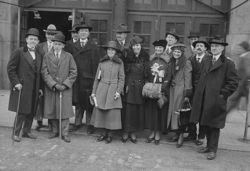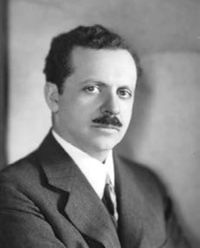Edward Bernays
 From Conservapedia
From Conservapedia | Edward Bernays | |||
|---|---|---|---|
| |||
| Born | November 22, 1891 Vienna, Austria | ||
| Died | March 9, 1995 Cambridge, Massachusetts | ||
| Spouse | Doris E. Fleischman | ||
Edward Louis Bernays (November 22, 1891 - March 9, 1995) was a journalist, author, the nephew of Sigmund Freud, a progressive,[1][2][3] and an early innovator in modern techniques of propaganda and social psychology. He is widely regarded as the 'Father of Public Relations'.[4]
Bernays was a member of the Committee on Public Information, a position which helped him refine his abilities.[5]
In 1990, Life Magazine named Bernays in its list of 100 most influential Americans of the 20th century.[6]
Contents
Early life[edit]
Edward Bernays was born on November 22, 1891, in Vienna, Austria, to Eli Bernays and Anna Freud Bernays.[7] His family emigrated to America when Edward was still an infant.
Anna Freud was the sister of Sigmund Freud.

In 1922, he married Doris Fleischman,[8] and they had two daughters: Anne Bernays and Doris Bernays Held.[9]
Propaganda campaigns[edit]
Edward Bernays was a master propagandist. Among Bernays more well known campaigns are the following:
- While working for the Medical Review of Reviews, Bernays played a role in the creation of a play called Damaged Goods, which focused on the effects of the disease syphilis.[10] Bernays himself described it as a "propaganda play that fought for sex education."[11]
- Campaign for the NAACP, hosted first convention in Atlanta, Georgia in 1920.[12]
- Working for the Beech-Nut corporation, Bernays helped to position bacon and eggs as the true all-American breakfast.[13][14][15]
- "Light’s Golden Jubilee", a celebration of the invention of the lightbulb.[16]
- "Torches of Freedom", Bernays set up an elaborate display of debutantes sparking up their cigarettes, meanwhile he made sure to contact members of the press to capture the moment.[17] In addition to positioning the media and their photographers, Bernays convinced the women to place the cigarettes within their garter belts,[18] and at the appropriate time, light them so that good pictures could be taken.[19]
- Dixie Cups campaign in the 1930's.[20] Bernays leveraged the work of Freud and used science against the American consumer. To help sell more paper cups, Bernays created a "Committee for the Study and Promotion of the Sanitary Dispensing of Food and Drink",[21][22][23] which is just as fictitious sounding as it really was. But back then, Americans had not see the massive use of science by progressives to achieve their goals the way we see today.
- United Fruit Company, in order to increase sales of bananas. This particular campaign included Bernays once again calling on his media pals, similar to the Torches of Freedom campaign, resulting in a coup against the communist regime of Guatemala. The New York Times, Newsweek, and others helped Bernays by publishing articles portraying the looming red threat.[24][25][26][27][28] Bernays wife, Doris, was a close relative of the New York Times publisher, Arthur Hays Schulzberger, a fact which Bernays exploited. Bernays understood very well how much weight reporting from the New York Times was, so that was his primary target.[29]
He was retained by other clients, such as Procter & Gamble and the Mack Truck corporation.
The Century of the Self[edit]
In 2002, the BBC developed a four-part series about Bernays titled The Century of the Self, which details some of Bernays' methods and some background in psychoanalysis.[30]
Curiously, The Century of the Self goes out of its way to omit Bernays' time working for the CPI.
Views[edit]
Anne Bernays, Edward's daughter, described his viewpoint this way:
- "Democracy to my father was a wonderful concept, but I don't think he felt that all those publics out there had reliable judgment, and that they very easily might vote for the wrong man or want the wrong thing; so that they had to be guided from above. It's enlightened despotism in a sense."
She also recalled his frequent use of the word "stupid":
- "The people who worked for him were stupid, the children were stupid, and if people did things in a way that he wouldn't have done them, they were stupid. It was a word that he used over and over: "don't be stupid". And the masses? - They were stupid."[31]
Paul Mazur, a close friend of Bernays stated the following:
- "We must shift America, from a needs to a desires culture. People must be trained to desire, to want new things even before the old have been entirely consumed."[32]
Bernays was just the man to make it happen.
Death and legacy[edit]
Edward Bernays passed away in Cambridge, Massachusetts, on March 9, 1995. He was 103 years old.[33] His legacy is subject to considerable controversy due to the nature of Bernays methods in manipulating people. Oftentimes, Bernays' elitist progressive viewpoints are overlooked while conspiracies about corporate dominance are exaggerated in a lopsided fashion.
Another highly controversial aspect of Bernays legacy, is the use of his work in Nazi propaganda. Bernays most infamous follower was Joseph Goebbels. Edward Bernays was not a Nazi and did not support Nazi causes. However, Bernays wrote in his own autobiography:
Karl von Wiegand, foreign correspondent of the Hearst newspapers, an old hand at interpreting Europe and just returned from Germany, was telling us about Goebbels and his propaganda plans to consolidate Nazi power. Goebbels had shown Wiegand his propaganda library, the best Wiegand had ever seen. Goebbels, said Wiegand, was using my book Crystallizing Public Opinion as a basis for his destructive campaign against the Jews of Germany. This shocked me, but I knew any human activity can be used for social purposes or misused for antisocial ones. Obviously the attack on the Jews of Germany was no emotional outburst of the Nazis, but a deliberate, planned campaign.[34][35]
The Nazis learned many of their propaganda techniques from American progressives. Crystallizing Public Opinion was written only three years after the Committee on Public Information was shut down.
Quotes[edit]
The following quotes are taken from Bernays' book, Propaganda:
- "The conscious and intelligent manipulation of the organized habits and opinions of the masses is an important element in democratic society. Those who manipulate this unseen mechanism of society constitute an invisible government which is the true ruling power of our country. ...We are governed, our minds are molded, our tastes formed, our ideas suggested, largely by men we have never heard of. This is a logical result of the way in which our democratic society is organized. Vast numbers of human beings must cooperate in this manner if they are to live together as a smoothly functioning society. ...In almost every act of our daily lives, whether in the sphere of politics or business, in our social conduct or our ethical thinking, we are dominated by the relatively small number of persons...who understand the mental processes and social patterns of the masses. It is they who pull the wires which control the public mind."
- "There are invisible rulers who control the destinies of millions. It is not generally realized to what extent the words and actions of our most influential public men are dictated by shrewd persons operating behind the scenes."
Works[edit]
- The Broadway Anthology, (1917)
- Crystallizing Public Opinion, (1923)
- An Outline of Careers: A Practical Guide to Achievement by Thirty-Eight Eminent Americans, (1927)
- Verdict of Public Opinion on Propaganda, (1927)
- Propaganda, (1928)
- Public Relations, (1945)
- Your Place at the Peace Table: What You Can Do to Win a Lasting United Nations Peace, (1945)
- Communism in Guatemala, (1954)
- The Engineering of Consent, (1955)[36]
- Your Future in Public Relations, (1961)
- Biography of an Idea: Memoirs of Public Relations Counsel, (1965)
References[edit]
- ↑ 'Glenn Beck': Progressives' Fight for American Hearts and Minds, Fox News
- ↑ Progressive Intellectuals and the Dilemmas of Democratic Commitment
- ↑ Power Systems: Conversations on Global Democratic Uprisings and the New Challenges to U.S. Empire
- ↑ Edward Bernays, 'Father of Public Relations' And Leader in Opinion Making, Dies at 103
- ↑ The Americanization of West Virginia: Creating a Modern Industrial State, 1916-1925
- ↑ The Father of Spin: Edward L. Bernays and The Birth of Public Relations
- ↑ The Unseen Power: Public Relations: A History
- ↑ Papers of Doris Fleischman Bernays
- ↑ PUBLIC RELATIONS PIONEER EDWARD L. BERNAYS DIES, Washington Post
- ↑ Reputation Management: The Key to Successful Public Relations and Corporate Communication
- ↑ Trust Us, We're Experts PA: How Industry Manipulates Science and Gambles with Your Future
- ↑ Anti-Social Engineering the Hyper-Manipulated Self
- ↑ Freud's Nephew and the Origins of Public Relations
- ↑ Edward L. Bernays Beech-Nut Packing Co
- ↑ Bacon for breakfast?
- ↑ "Light's Golden Jubilee" (October 21, 1929)
- ↑ Edward Bernays, 'Father of Public Relations' And Leader in Opinion Making, Dies at 103, The New York Times
- ↑ Silent Film Comedy and American Culture
- ↑ Corporate Diplomacy: Building Reputations and Relationships with External Stakeholders
- ↑ Silent Film Comedy and American Culture
- ↑ The New Yorker, Volume 74
- ↑ The Father of Spin: Edward L. Bernays and the Birth of Public Relations
- ↑ The Truth about Cancer: What You Need to Know about Cancer's History, Treatment, and Prevention
- ↑ Moveable Feasts: From Ancient Rome to the 21st Century, the Incredible Journeys of the Food We Eat
- ↑ Yugoslavia Unraveled: Sovereignty, Self-Determination, Intervention
- ↑ Partly Cloudy: Ethics in War, Espionage, Covert Action, and Interrogation
- ↑ The Untold History of the United States
- ↑ Overthrow: America's Century of Regime Change from Hawaii to Iraq
- ↑ The Father of Spin: Edward L. Bernays and The Birth of Public Relations
- ↑ The Century of the Self
- ↑ Century of the Self 1, 28:30 - 32:20
- ↑ Economists and the Powerful: Convenient Theories, Distorted Facts, Ample Rewards
- ↑ The Lives They Lived: Edward L Bernays and Henry C. Rogers;The Fathers of P.R.
- ↑ Biography of an Idea: Memoirs of Public Relations Counsel, page 652.
- ↑ Pr!: A Social History Of Spin
- ↑ The Father of Spin: Edward L. Bernays and the Birth of Public Relations
External links[edit]
Categories: [Progressive Era] [Propagandists]
↧ Download as ZWI file | Last modified: 02/16/2023 22:02:30 | 52 views
☰ Source: https://www.conservapedia.com/Edward_Bernays | License: CC BY-SA 3.0
 ZWI signed:
ZWI signed:
 KSF
KSF